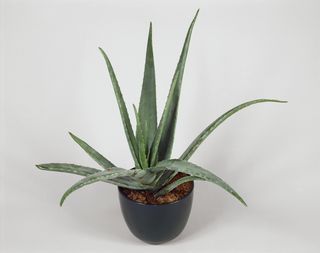Home » Diet & Food »
Aloe Vera Juice Will Probably Make You Poop—A Lot

Aloe vera is most commonly known for its ability to stop a burn from hurting so damn much.
But now, the plant’s juice—aloe vera juice or aloe water—is being hailed as the newest weight-loss fix, with proponents claiming that drinking the stuff can speed up metabolism, promote proper digestion, and help you burn extra fat and calories. (And that’s after it does wonders for your skin, according to Drew Barrymore.) So uh, is any of this legit?
What is aloe vera juice?

Okay, so aloe vera juice comes from the aloe vera plant, a type of succulent. The leaves of the aloe vera plant are where the magic happens: Each leaf contains a clear gel that can be used to treat burns or wounds, according to National Institute of Environmental Health Sciences (NIEHS). The leaves themselves—specifically a layer known as latex—can be made into a juice or dried and taken orally as a laxative, per the NIEHS.
Yep, you heard that right: laxative. The leaves of aloe plants contain the compound anthraquinone, called aloin, which has laxative properties, per the NIEHS.
So…is aloe vera juice healthy to drink?
Aloe vera contains polyphenols, which are a type of antioxidant, says Beth Warren, R.D.N., founder of Beth Warren Nutrition and author of Secrets of a Kosher Girl. Studies show it also has vitamins A, C, E, as well as B vitamins and anti-inflammatory enzymes and plant sterols…so, sure, theoretically it’s healthy.
But there are two different kinds of aloe vera juice: Juice that comes from the clear, gel-like substance inside aloe vera leaves (mixed with water and sugar), and juice made from whole aloe vera plant leaves. This is the stuff you’ll likely find on the shelves of your local Whole Foods.
Juice made from the clear gel substance—often known as aloe water—can actually contain more sugar than actual aloe vera, says Warren. (Some versions contain nearly six teaspoons of sugar, bringing it closer to a soda than a health sip.) These also likely have the laxative component of aloe vera removed, so you can probably drink these without needing a bathroom nearby.
Whole leaf aloe vera juice, however, is often sold as a dietary supplement at health stores and vitamin shops, and is marketed to promote gastrointestinal health and regularity (thanks to its laxative properties), says Warren.

You do not want to down an entire bottle of whole leaf aloe vera juice. Instead, the directions advise having a couple of ounces or mixing it with juice before consuming, says Warren. Some brands also come as powdered drink mixes that contain other ingredients, like stevia.
Something else to keep in mind: Whole leaf aloe vera juice is considered a supplement, which isn’t regulated by the Food and Drug Administration, says Warren—that means you can never be 100 percent sure of what you’re getting, she says. (That’s true for aloe vera water, too, but since the laxative properties are removed, there’s less risk involved.)
Well, can it help me lose weight?
The truth is, aloe vera juice will pretty much just make you poop, “which can result in temporary water loss and therefore, weight,” says Warren.
And sure, after you go, you may see the scale move down a bit (depending on, uh, how bad you had to go), but that’s not a reliable way to spur long-term weight loss.
But also: That only holds true for the whole-leaf variety; the other stuff (the sugar-laden juice in the grocery store that likely contains no aloin) won’t do anything for the scale—in fact, those additional sugar calories might even lead to weight gain if you drink it down regularly.
So, should I drink aloe vera juice to lose weight?
That’s a hard no. According to Warren, if you’re taking a laxative in order to lose weight, it may be a sign of a disordered eating habit.

If you’re interested in consuming aloe as a natural laxative because you’re having trouble with number twos, talk to your doctor about your digestive issues. Laxatives may affect the absorption of or interact with other medications you’re taking, and aloe vera can lead to abdominal cramps and diarrhea, according to the Mayo Clinic. Taking large quantities of aloe latex can also have pretty serious health consequences, including kidney damage.
If you’re still aloe-curious, go ahead and try some bottled options that contain just aloe vera and water (and maybe some lemon), says Warren, to get an extra helping of A, C, E, and B vitamins—just make sure you steer clear of tons of added sugars or artificial ingredients that you, frankly, just don’t need.
The bottom line: Used as a laxative, aloe vera juice is definitely not an effective way to lose weight.
Source: Read Full Article


